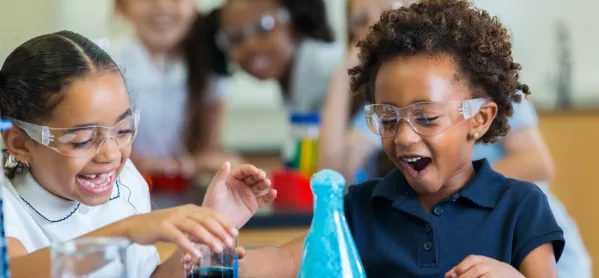Exclusive: Covid cost for new science teachers revealed

Covid restrictions have left trainee and first-year science teachers feeling unprepared to teach practical lessons, a new survey has found
The research conducted by the Royal Society of Chemistry reveals how Covid restrictions have impacted on science teacher training, especially as far as practical skills are concerned - as many teacher training providers were unable to train their cohorts on how to teach practical lessons.
It found that more than half - 52 per cent - of trainee and first-year chemistry teachers said they felt unprepared to teach practical chemistry lessons.
Warning: Closed school labs will hit future of science
Timss 2019: England’s secondary science at record low
Comment: Could coronavirus change science education?
Survey: GCSE science grades will be hit by Covid, say teachers
And 78 per cent of trainee chemistry teachers and 56 per cent of chemistry first-year teacher said they felt they had fewer training opportunities in teaching practicals than they required.
A trainee teacher said: “I have not been able to perform any class practicals at all. This is a huge section of the science curriculum that is completely untested.”
The findings came as a Tes survey of GCSE and A-level teachers found that one in five schools (21 per cent) had not yet reopened its science laboratories for practical work.
According to the RSC report, training providers are concerned about the lack of practical training, too.
One provider received feedback from a school that their newly qualified teacher had “a fear of doing chemistry practicals because of limited experience of how to deliver one”, the report explains.
Another provider told the RSC: “We need them to be in a lab, to train them in a lab, to touch equipment, to talk about their misconceptions”.
The RSC comments in the report that this situation could have long-term consequences. It says: “We are concerned that if these cohorts of new teachers are not supported, they may lack confidence which could impact the quality of their teaching and lead some to withdraw from the profession altogether.
“This could lead to less student engagement with chemistry and therefore fewer young people will choose a career in chemistry.”
The majority of respondents (78 per cent) told the RSC that Covid restrictions had a negative impact on their school placement experience.
Schools closures and online teaching meant they had fewer opportunities to develop core skills, observe colleagues, conduct practical sessions and interact with students to build important learning relationships.
One of the respondents commented: “The major impact has been that teachers have a massive workload … which in turn has meant that they are not so able to assist trainee teachers. For instance, my mentor is snowed under moderating assessments in an effort to provide fair grading for students.
“This obviously takes priority over mentoring. It is not that they are not trying, it is just that there is not the bandwidth.”
The Royal Society of Chemistry is now calling on the government to plug the skills gap for early career science teachers whose training has been affected by Covid with £7 million in extra funding. This would address immediate needs for CPD focused on practical teaching.
It is also developing a tailored package of support for early career science teachers and trainees to improve their skills and confidence, available via its website.
Sarah Robertson, director of education and professional practice at RSC, said “Trainee and first-year teachers have had an incredibly challenging start to their teaching careers.
“After months away from the classroom, this generation has faced barriers to developing essential teaching skills from behaviour management to teaching practicals.
“We are concerned that such an inconsistency in school placement experience has impacted the quality of teaching they are able to deliver, particularly in terms of the knock-on effect this will have on students’ interest and engagement with practical subjects like the sciences.
“Practical work is an essential part of an inspirational education in chemistry and across the sciences, and it is worrying that this group have missed vital opportunities to develop these skills.”
New teachers’ lack of confidence was not only limited to practical skills, as 64 per cent of respondents said the pandemic had had a negative impact on essential teaching skills, such as behaviour management.
The Royal Society of Chemistry survey was conducted in the UK in April 2021. Respondents were made up of 179 trainee science teachers and 80 first-year science teachers.
You need a Tes subscription to read this article
Subscribe now to read this article and get other subscriber-only content:
- Unlimited access to all Tes magazine content
- Exclusive subscriber-only stories
- Award-winning email newsletters
Already a subscriber? Log in
You need a subscription to read this article
Subscribe now to read this article and get other subscriber-only content, including:
- Unlimited access to all Tes magazine content
- Exclusive subscriber-only stories
- Award-winning email newsletters
topics in this article



